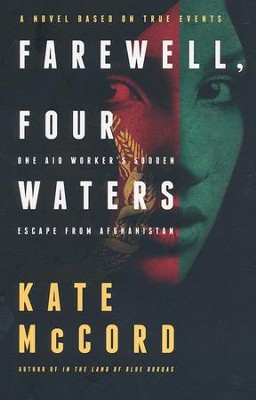 To be clear, this is a work of fiction, but it is based on a number of real events. Rather than the suspenseful tale I was expecting, this is really more of a tribute to Afghanistan - the people and the land, the good and the bad, and the beautiful and the ugly. As Marie is falling in love with the village of Four Waters, it is easy to be caught up in her enthusiasm and fall in love too. The people are by no means perfect - great wrongs have been done and continue to be done, even within the most important families - but their humanity is clear.
To be clear, this is a work of fiction, but it is based on a number of real events. Rather than the suspenseful tale I was expecting, this is really more of a tribute to Afghanistan - the people and the land, the good and the bad, and the beautiful and the ugly. As Marie is falling in love with the village of Four Waters, it is easy to be caught up in her enthusiasm and fall in love too. The people are by no means perfect - great wrongs have been done and continue to be done, even within the most important families - but their humanity is clear. I enjoyed learning about the Afghan culture. While I would not say I am an expert after reading this, the story offers much to appreciate about the Afghan people, and it has much to teach about the culture, especially the women's role. As Americans, we tend to think of Afghanistan as peopled by terrorists and the poor oppressed who cannot fight them, and that the Muslim men have all the rights and the women have none. However, there are many people groups within the country, and even within cities and villages, with all manner of economic situations. While women may have fewer rights, the rules governing their behavior are not as strict as the media would have us believe. Or at least such was my understanding after reading this book.
My problem with Marie is that she is pretty aloof - she tends to hold back from the other aid workers, even her housemate, to avoid being hurt (which doesn't work), and, while she exhibits tons of compassion for the Afghan people, she doesn't show it well with her coworkers. I don't like how she has separated herself mentally from them, and it makes it hard to really connect with her. However, events do force a shift in priorities and attitude, which help near the end.
One thing the author hits right on the head is how we so often think of prayer and God. "How do I know God is with me? I pray. I'm sad, angry, excited, maybe just bored. Then I pray and remember--God's with me. I feel His presence. She chided herself. But really, most of the time I just forget. I work. I get busy. I live here like I'm alone. Most of the time, anyway" (171). It's a really easy trap to fall into. If someone asks us how we know God is there, we have an easy answer - I pray and He answers, or I feel His presence. But do we really live each moment of every day with Him? Are we actually treating Him like He is with us all the day long?
This book reads differently than most novels, and I think it is because its goal is to convey real experiences (though not necessarily the exact situations the author went through). I've read novels with more poignant prose and greater flare for a story, but this one feels real, whereas most suspense novels are simply an enjoyable escape from reality. While I did not love the book, I feel it tells an important tale that will help the average American truly connect with the experiences of foreign aid workers, missionaries, and, above all, a people we tend to misunderstand.
Thank you Moody Publishers for a free book in exchange for an honest review; I was not required to make it positive, and all opinions are my own.
No comments:
Post a Comment